The Stoic Rule for Life You Need, Based On Your Enneagram Type
I’ve always been inspired by the Stoic thinkers like Marcus Aurelius, Epictetus and Seneca. Their simple yet absurdly profound quotes and philosophies of life have been around for centuries, and they can be just the catalyst we need to pull us in a new direction. I hope you’ll find their wisdom as inspiring as I have!
Not sure what your Enneagram type is? Take our free questionnaire here

The Stoic Rule for Life You Need, Based On Your Enneagram Type
Enneagram Type 1 – The Perfectionist
“Accept the things to which fate binds you, and love the people with whom fate brings you together, but do so with all your heart.” – Marcus Aurelius
As an Enneagram One, you believe in a higher calling. Rather than giving into your impulses, you set a strict code of conduct for yourself to follow. This can cause you to be hard on yourself and others; constantly seeing errors that need to be “fixed.” Ultimately, this can lead you to being rigid, stressed, tense, and overwhelmed by negativity.
The path to growth for a One is acceptance. Acceptance of our own flaws and imperfections and the flaws and imperfections of others. This quote by Marcus Aurelius reminds Ones that to live with a full heart and to accept what life inevitably gives you is the key to freedom and peace. As Ones adopt this Stoic rule into their life they can find a release from tension, an ease in the need to “control” everything, and a deeper sense of contentment in the messiness and beauty of life. It can also help them to experience more profound intimacy in relationships because they are no longer trying to control or “fix” the other person.
Discover more about the One: 21 Signs That You’re an Enneagram One Type
Enneagram Type 2 – The Helper
“You have power over your mind – not outside events. Realize this, and you will find strength.” – Marcus Aurelius
As an Enneagram Two, you believe in serving others and spotting peoples’ needs and concerns. You see yourself as a supporter; either emotionally or in tangible ways (or both). Deep down, you believe that by giving of yourself you can find value and worth. What others receive from you makes you feel valuable. But unfortunately, average to unhealthy Twos constantly chase after this feeling of being needed. They see themselves as indispensable to others, and are thus deeply impacted by how others respond to them. Many times they feel taken advantage of, exhausted, or unloved for who they really are at their core.
The Stoic mindset for Twos to follow is the reminder from Marcus Aurelius that you have power over your mind, not outside events or others’ reactions. For Twos, integrating the self – getting in touch with you and your core thoughts and emotions – is crucial. It’s the only way to find true self-value and love. In this mind set it becomes easier for Twos to be in touch with their real needs, boundaries, and desires, rather than constantly projecting or seeking out external validation. This Stoic quote is a powerful reminder that inner strength comes when we realize our power lies within our own minds, hearts, and souls – not in the opinions of others.
Discover more about Twos: 21 Signs That You’re an Enneagram Two Type
Enneagram Type 3 – The Achiever
“No person has the power to have everything they want, but it is in their power not to want what they don’t have, and to cheerfully put to good use what they do have.” – Seneca
As a Three, you are on a constant race for this evanescent thing called “Success” or “Worth.” Deep down, you grapple with the feeling that without success you are worthless or unlovable. But rather than dwell on this vulnerable emotion, you keep on chasing, running, and climbing for something that will make you feel whole. The danger here is that Threes will often find themselves stuck in a cycle of never-ending achievement – pushing themselves to perform, but never feeling satisfied.
The Stoic Rule for life for Threes is to come to terms with the fact that we can never achieve everything there is to achieve. We will never be masters of every race, holder of every trophy, or star in each performance. The Stoic quote from Seneca reminds us that it’s not in our power to have everything we want, but it is in our power to be content with what we do have and use it to the best of our abilities. This can help Threes accept their own limitations without judgement and find joy in simpler things they can put to good use. Look at the stockpile of what you already have; how can you use that to benefit yourself or someone else? How can you use your talents to make the world a better place? What can you give yourself of your skills and gifts? Take a moment to cultivate gratitude for the inner worth you already possess, and find peace in that knowledge. With that, your ambition can be channeled into a healthier, more fulfilling direction.
Find out more about Threes: 21 Signs That You’re an Enneagram 3
Enneagram Type 4 – The Individualist
“External things are not the problem. It’s your assessment of them. Which you can erase right now.” – Marcus Aurelius
As a Four, you often feel like a misfit in a world full of conformists. You easily see differences between yourself and others; and sometimes you can feel overcome by a feeling of “otherness” – a feeling of not being seen. Artistic or creative expression becomes a solace and you have the power to reveal deep insights about the human experience and the emotions many people shy away from. However, along with this profound insight, you also struggle with melancholy moods or dark feelings of despair. Envy is one of the core weaknesses of the Four, and this can lead you into the belief that you have less than others; that you are more deficient or more lacking in some way.
The above quote from Marcus Aurelius is a strong reminder that mindset can make or break you. Your feelings don’t have to define you. While it may be hard to control fiery or dark emotions, you can also experiment with your mindset to try to find a new assessment of the situation. The Stoic reminder here is that we are in charge of our view of external events – we can choose how we react and what story we tell ourselves about those experiences. When you start seeing the shared struggles of humanity and finding cohesion and harmony with others because of these shared plights, you begin to sense that you are not alone. When you see your differences as talents, strengths, and tools which you can use to influence the world, you begin to see that your “otherness” is not a curse but rather a strength. When you stop playing the comparison game and see challenges as part of the messy struggles of life we all share, you can start to see beauty in pain, unity in the human struggle, and joy in your own uniqueness.
Find out more about Fours: The Enneagram 4: The Individualist
Enneagram Type 5 – The Investigator
“That’s why the philosophers warn us not to be satisfied with mere learning, but to add practice and then training. For as time passes we forget what we learned and end up doing the opposite, and hold opinions the opposite of what we should.” – Epictetus
As a Five, you often find yourself lost in your own thoughts and ideas. You can become consumed with knowledge and have an insatiable curiosity for understanding the world around you. The danger here is that this tendency to intellectualize can lead to a sense of disconnection from reality – if we’re too caught up in our heads, we lose touch with the world and its inhabitants.
The Stoic quote from Epictetus is a strong reminder to take our knowledge and turn it into practical action. Knowledge without application can become like empty words – we need to act upon what we learn if it’s ever going to make a difference in the world. This advice is especially pertinent for Fives, who can get so caught up in their heads that they forget to take action. If we want to make a change in our world, it’s not enough just to know about the problem – we have to do something about it. Practicing and training with what we learn will help us turn knowledge into wisdom, and give us the power to bring our ideas into the physical world in a meaningful, satisfying way.
Discover more about Enneagram Fives: The Enneagram 5: The Investigator
Enneagram Type 6 – The Loyalist
“We are more often frightened than hurt; and we suffer more in imagination than in reality.” – Seneca
As a Six, you have a deep struggle with anxiety and fear. You have an innate need for security, and you hope that if you ruminate or catastrophize about worst-case scenarios you won’t be caught off-guard. It seems to you that events play out like falling dominoes, inevitably leading to eventual disaster at any possible moment. Thus you ruminate, worry, prepare, test, and ruminate some more. Your head buzzes with all the ideas of things that could go wrong.
The Stoic quote from Seneca is a reminder that our anxieties can be bigger in our minds than they are in real life. Our worries are often an exaggeration of reality, creating hellscapes in our minds that are so much worse than the reality in our lived experience. We need to remember that whatever we’re afraid of – whether it’s failure, rejection, abandonment, or any other fear – cannot defeat us unless we let it. When we ruminate on our anxieties, we give them power and allow them to cloud our judgement. Sometimes this rumination even leads to self-fulfilling prophecies. Instead, we need to recognize our fears for what they are – a natural part of life – and find ways to trust our inner strength and wisdom. Play “I Spy” for blessings and beautiful things in your midst. Try deep breathing and visualization when you feel yourself reverting to fear and anxiety. Learn to cultivate mental peace; it can be a challenge, but meditation, prayer, deep breathing, and even therapy can help. When we can find joy and peace even amid our fears, we have taken a powerful step towards conquering them.
Find out more about Sixes: The Enneagram 6: The Loyalist
Enneagram Type 7 – The Enthusiast
“Do not indulge in dreams of having what you have not, but reckon up the chief of the blessings you do possess, and then thankfully remember how you would crave for them if they were not yours.” – Marcus Aurelius
As a Seven, you have a hunger for new experiences and adventures. Your enthusiasm is contagious and you often find yourself surrounded by friends and loved ones who are drawn in by your sense of fun and possibility. The danger here is that this constant search for exhilaration can lead to restlessness. You can easily become so focused on what you don’t have or what you haven’t done yet that you forget to savor the moment. Many Sevens struggle with FOMO (Fear of Missing Out) and chase after pleasure and excitement, never quite feeling satisfied with what they have.
The Stoic quote from Marcus Aurelius is a reminder to take time and appreciate the blessings you already have in your life. Life is too short to spend it in perpetual search for more. Rather than constantly reaching for the next best thing, pause, look within, and recognize all the good that you already have in your life. Taking time to reflect and meditate on gratitude can help Sevens settle into a sense of contentment and satisfaction, freeing them from the paralysis of chasing after elusive thrills. When we’re able to practice gratitude for what we have, it helps us find joy in the present moment – not just through seeking new pleasures and sensations, but also through finding true joy in those simple pleasures that exist in every moment. With this practice of gratitude, you can find a level of peace and contentment that will stay with you wherever we go.
Find out more about Sevens: The Enneagram 7: The Enthusiast
Enneagram Type 8 – The Challenger
“Any person capable of angering you becomes your master; he can anger you only when you permit yourself to be disturbed by him.” – Epictetus
As an Eight, you are a passionate and powerful leader. You stand up for the vulnerable and fight against injustice, with no shortage of energy and courage. But it’s easy to get wrapped up in the heat of battle – Eights are known for their strong emotions and fierce temper. It’s easy to become overwhelmed in moments when a situation isn’t going your way – you risk becoming a slave to anger, giving away your power and control.
The Stoic quote from Epictetus is an important reminder that we can’t control the actions of others or the outcomes of events, no matter how much we want to. We can only control our reactions. It’s easy to get caught up in the anger and frustration of a situation, but this energy can be used for good instead. When we take the time to step back and analyze our emotions before reacting, we are able to come up with creative solutions that help us break free from the bonds of our anger. We can use these moments to channel our passion into meaningful action and to step into our power. We can learn to recognize what sets us off, observe our emotions without judgment, and practice calming techniques that will help us stay mindful and level-headed in stressful moments. This way we can ensure that no one has control over our emotions except ourselves.
Find out more about Enneagram Eights: The Enneagram 8 – The Challenger
Enneagram Type 9 – The Peacemaker
“Caretake this moment. Immerse yourself in its particulars. Respond to this person, this challenge, this deed. Quit evasions. Stop giving yourself needless trouble. It is time to really live; to fully inhabit the situation you happen to be in now.” – Epictetus
As a Nine, you crave inner harmony more than just about anything else. However, at an average or unhealthy level, you tend to numb yourself to your true feelings in order to avoid conflict and maintain peace. You may zone out when tension is high, or go along with others to avoid rocking the boat. Sometimes people judge you for this, and that only makes matters worse because you work so hard to not be difficult. Not to be a problem. But inevitably when you go through life trying not to be a problem you can wind up feeling invisible and hurt. Instead, you should focus on what you do want to be.
The Stoic quote from Seneca is a reminder that in order to move through life with courage and clarity, we have to be willing to be fully present. The unhealthy Nine is asleep to his own desires, identity, needs, and feelings. The healthy Nine is fully awake; alive, present, and aware. Taking the time to acknowledge and embrace your feelings, whatever they may be, is key for moving through life with confidence and purpose. Inhabit yourself, but who you really want to be. Instead of resorting to distraction or passive-aggressiveness when life throws a wrench in your plans, remember that you are powerful enough to face any challenge. Life can be lived consciously if we choose to make it so. Your voice deserves to be heard.
Discover more about Nines: Enneagram Type 9 – The Peacemaker
What Are Your Thoughts?
Do you resonate with the quotes listed for your Enneagram type? Do you have any other Stoic quotes or rules of life that could be applied to your type? Share your thoughts in the comments below!
Resources:
Marcus Aurelius: Meditations, Penguin Classics (October 31, 2006)
The Enchiridion by Epictetus, Dover Publications; unknown edition (January 15, 2004)
The Enneagram Made Easy by Renee Baron & Elizabeth Wagele; HarperOne (1994)
The Wisdom of the Enneagram: The Complete Guide to Psychological and Spiritual Growth for the Nine Personality Types by Don Richard Riso and Russ Hudson, Bantam; 11th edition (June 15, 1999)


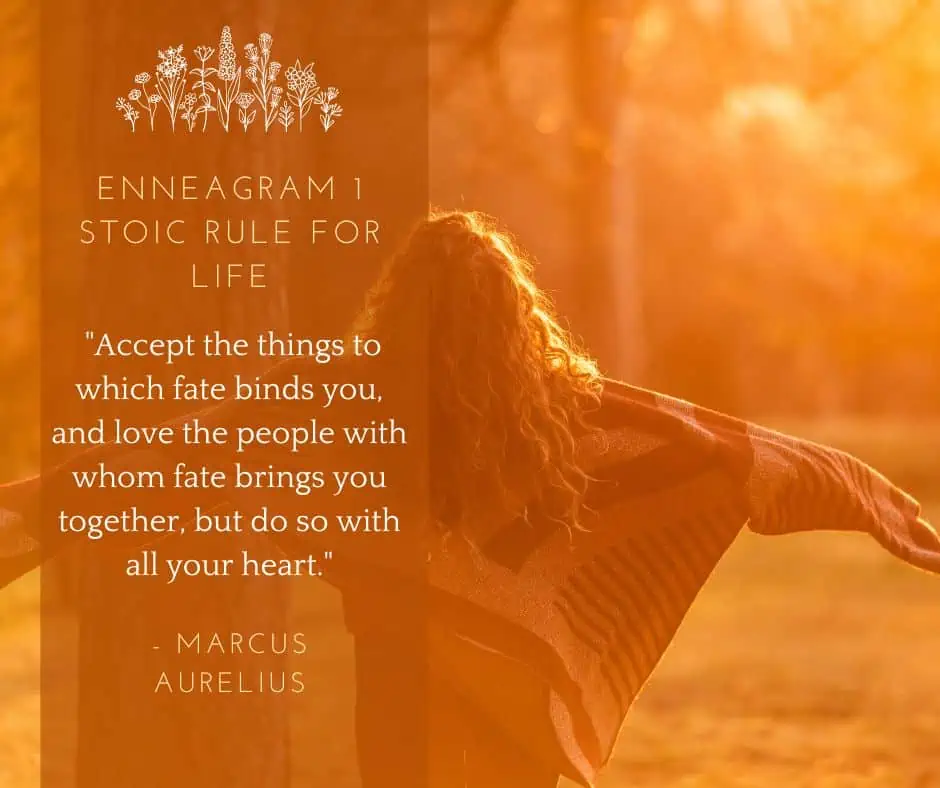
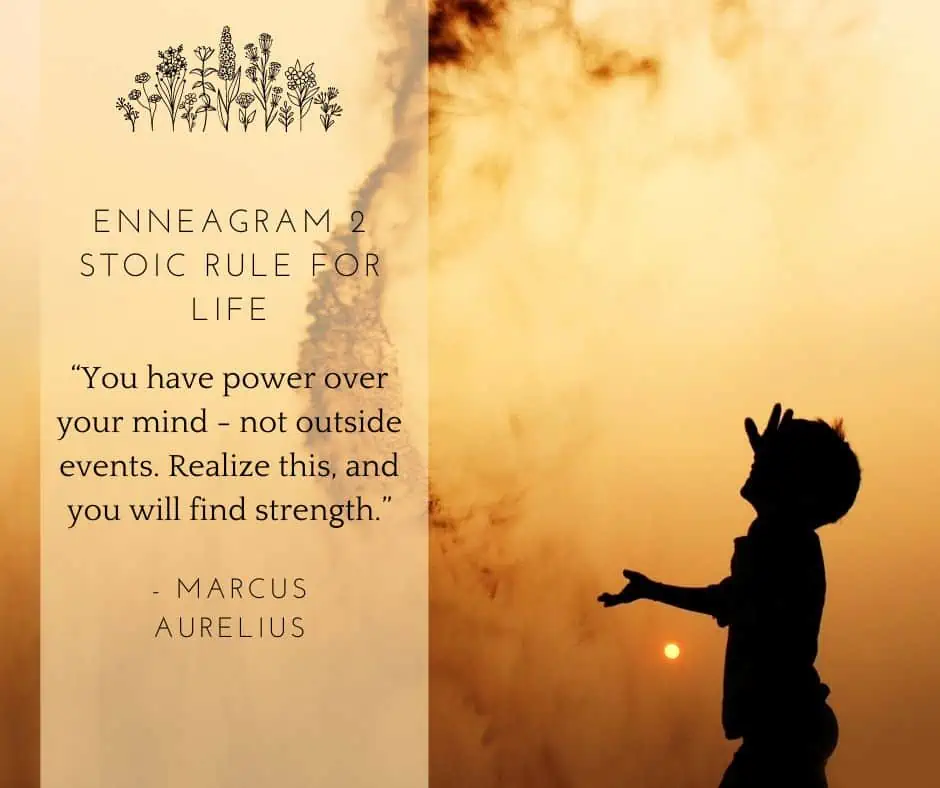
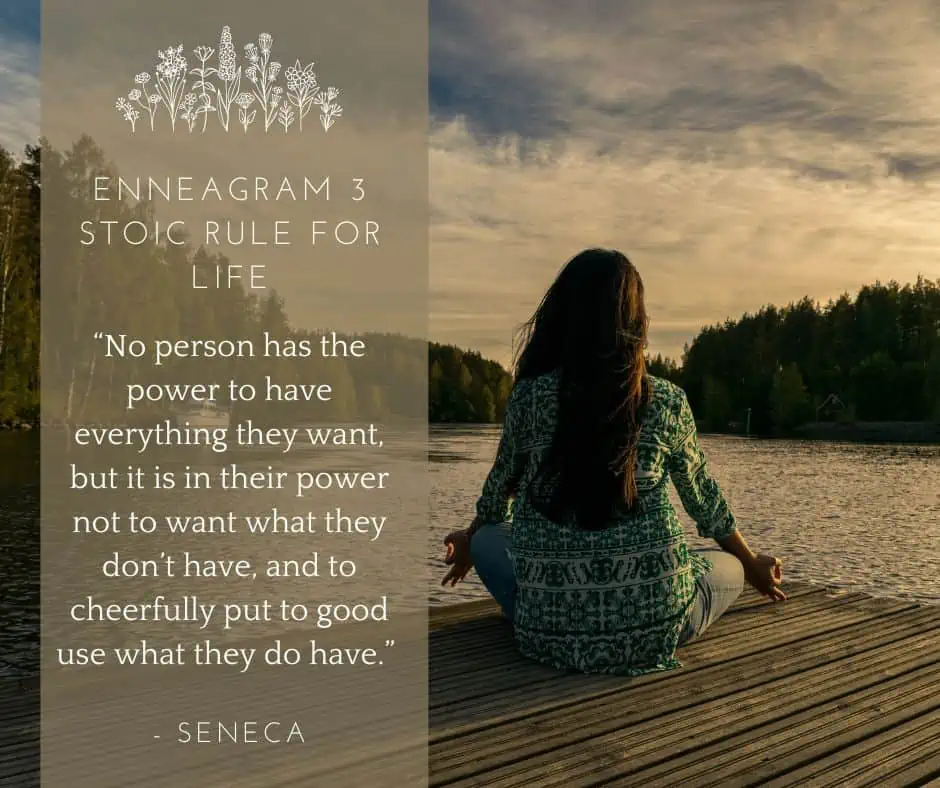
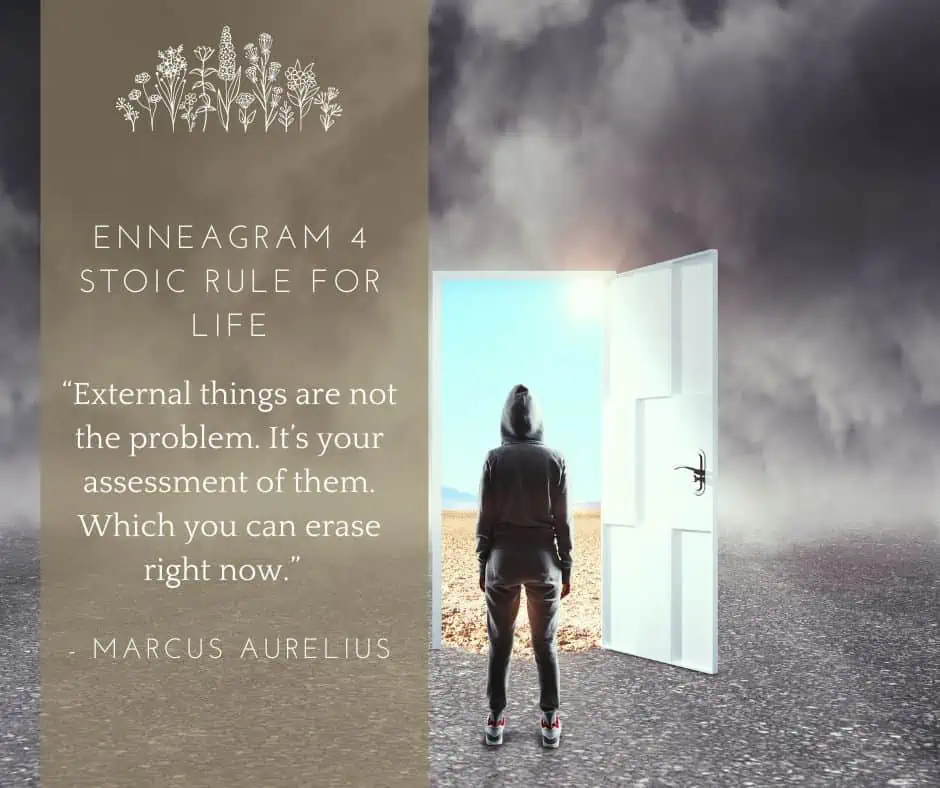


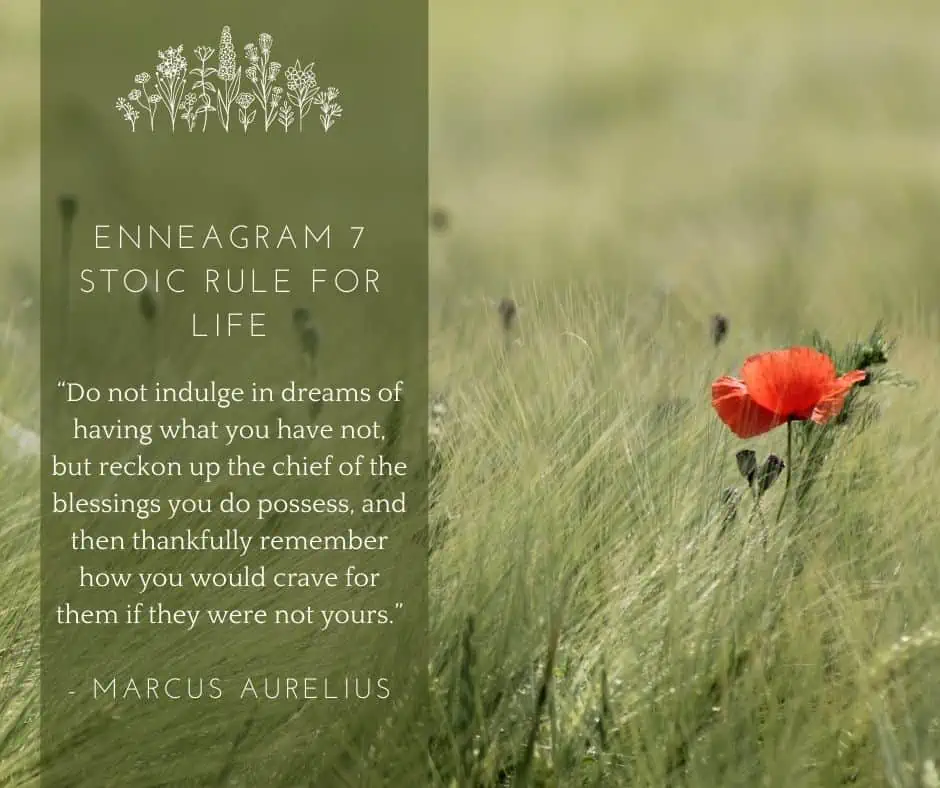
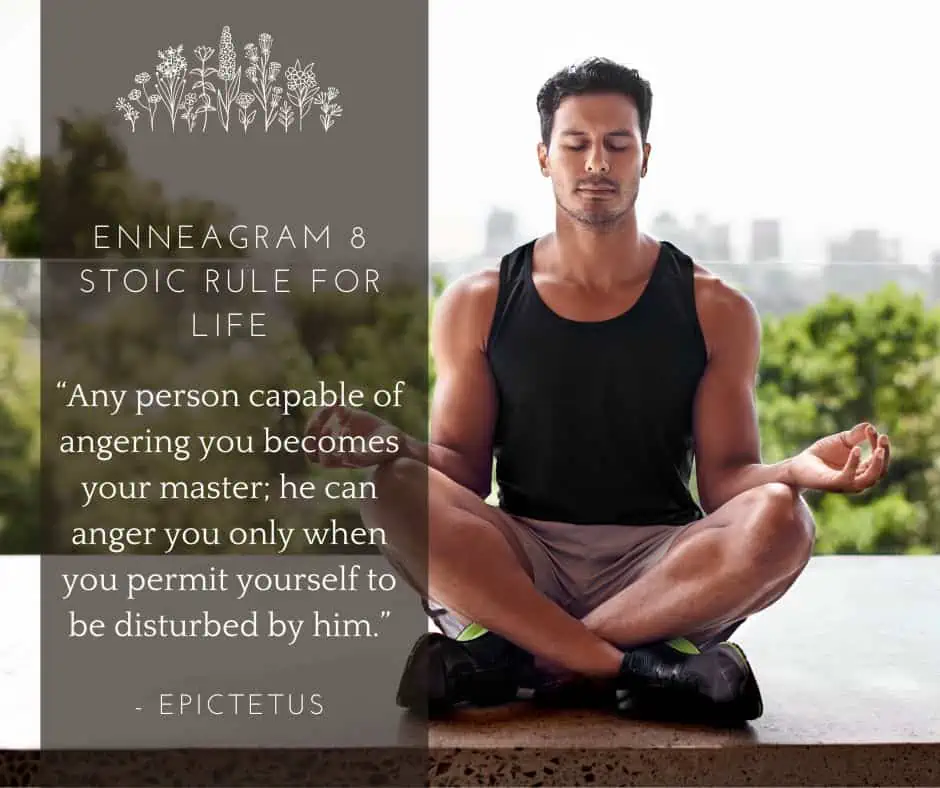













I’ve already been told something as that quote for the 8. I said, yes that’s true, it’s easy to anger me. But anyone angering me will have to deal with angry me…
Thing is, I’m rather comfortable with anger, but as an INTP who can find the right words to strike where it’ll hurt with full confidence, combined with an 8, I’ve seen more people regretting angering me than me regretting my anger.
I’m not mean for no reason. But people should think twice before angering me. There’s only that much I can hold in, and only when the context makes it necessary, but for any abusive abuse, I’ll lash out and it won’t be pretty, whatever the situation. Injustice won’t be tolerated.
Very thoughtful, life changing lesson. I am enlightened with this powerful and incredible concept of life lesson.
God bless!